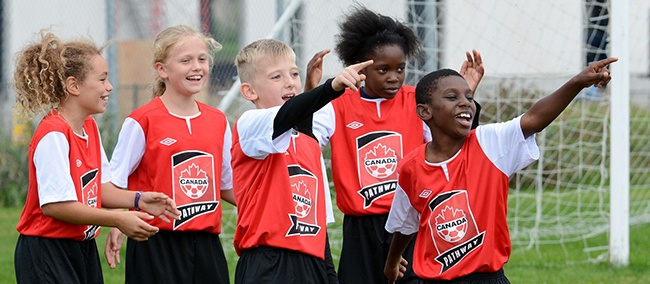
Canada: a leading soccer nation
With Canada Soccer’s Women’s National Team aiming to return to the podium at Rio 2016 and the Men’s National Team poised to play two important matches on the Road to Russia in September, the association responsible for the sport’s technical leadership is beginning to see its investments pay off.
Canada Soccer’s EXCEL program was launched to capitalize on its Long-Term Player Development (LTPD) program adopted in 2008. The program was built on four guiding principles, adhering to the stages of development from LTPD: physical, mental, technical/tactical, and social/emotional.
The Canada Soccer Pathway brings the development stages into focus for players of all ages and stages of development to deliver a holistic, grassroots-development platform for players of all ages. This strategic alignment is key to Canada’s establishment as a leading soccer nation.
Canada Soccer’s Women’s EXCEL Program accomplished something that none of the other 210 FIFA nations realised in 2014-15: top-eight finishes in FIFA World Cups at all three levels, U-17, U-20 and the FIFA Women’s World Cup Canada 2015™. In addition, Canada is the defending champions from the 2014 CONCACAF Girls’ Under-15 Girls Championship.
Canada Soccer’s Women’s EXCEL Program
Training to Train
Training to Compete
Training to Win#canw17 #canw20 #CANWNT pic.twitter.com/X9v5UBDX9p— Canada Soccer (@CanadaSoccerEN) August 2016
This progress is accompanied by growing expectations and relevance for the country’s largest participation sport.
“Our focus has been fixed on the key themes of extensive consultations held with Canadians on what is needed to grow the game domestically,” said Montopoli. “These are outlined in our current strategic plan as investments in technical leadership, consistent performance from our National teams, oversight and encouragement of the growth of the game and continued governance leadership.”
Since 2011, Canada Soccer’s Women’s EXCEL Program has been developed and led by current Women’s National Team Head Coach John Herdman.
“Consistent world-class performance on the highest stage is reliant on a development system that everybody in soccer believes in and contributes to,” said Herdman. “Canada Soccer has strengthened the ways we identify and develop the most promising young female athletes and help drive women’s soccer forward. These players, and the youth coming through our system, are evidence our pathway is working.”
With players like Kadeisha Buchanan, Ashley Lawrence, and Jessie Fleming progressing along the pathway, appearing in FIFA World Cups and Olympic Games at all levels, the transformation is clear.
For Montopoli, it’s part of the evolution of the game in Canada that started with the successful hosting of major FIFA competitions for men and women: the FIFA U-16 World Tournament Canada 1987, the FIFA U-19 Women’s World Championship Canada 2002, the FIFA U-20 World Cup Canada 2007, the FIFA U-20 Women’s World Cup Canada 2014, and the historic FIFA Women’s World Cup Canada 2015™.
“We have now advanced beyond our reputation as a top host of international events,” said Montopoli. “We are a leader in women’s soccer and have achieved consistent top-tier performances at every level and in every aspect of the game.”
That doesn’t mean the legacy of hosting successful events has faded. Montopoli has also overseen domestic attendance growth that includes a record-setting FIFA Women’s World Cup Canada 2015™, the largest attendance of any FIFA event outside of the FIFA World Cup. It also featured the highest attendance for a national team match in any sport, a record that was broken in March 2016 when Canada Soccer hosted a men’s FIFA World Cup Qualifiers match at BC Place (54,798 fans).
The Men’s EXCEL Program and development is led by Canada Soccer Technical Director Tony Fonseca.
With five professional clubs playing across the country in Vancouver, Edmonton, Toronto, Ottawa, and Montréal, the player development model has blossomed with Fonseca working hand-in-hand with provincial and territorial soccer associations as well as professional clubs and academies.
“There is a great atmosphere of collaboration with the professional clubs in developing the next generation of young players,” said Fonseca. “Whether to highlight and prepare a young player for the pathway, or to monitor a player that is already there, the relationships will pay big dividends in the future.”
The goal has been to expand the development system across the country that embraces the vision of a consistent player development process.
“In our alignment, with linking the provinces and the clubs (through EXCEL), players in those environments are learning the right things working every day with professionals. We have been making huge strides and the future is bright.”
On the men’s side, more than 150 youth players have already featured in the Men’s EXCEL program in 2016. From a two-year cycle, competitions at the U-20 and U-17 levels will take place in 2017, with the CONCACAF Men’s Under-20 Championship starting in February and the CONCACAF Men’s Under-17 Championship starting in April. Since 1979, Canada have won two CONCACAF youth titles and participated in 14 FIFA youth final competitions.
On the women’s side, qualifying for all three FIFA tournaments was an important milestone. So, too was the number of young players reaching the youth national team camps and the Women’s National Team.
In the past two years alone, 63 players from the Regional EXCEL programs have been called into camp with one of the youth national teams with five going on to train with the national squad including three players currently at Rio 2016, Gabrielle Carle, Deanne Rose and Jessie Fleming.
With strong collaboration, a clear path for player development, and success both on and off the pitch, Canada Soccer will continue to strive TO A GREATER GOAL.